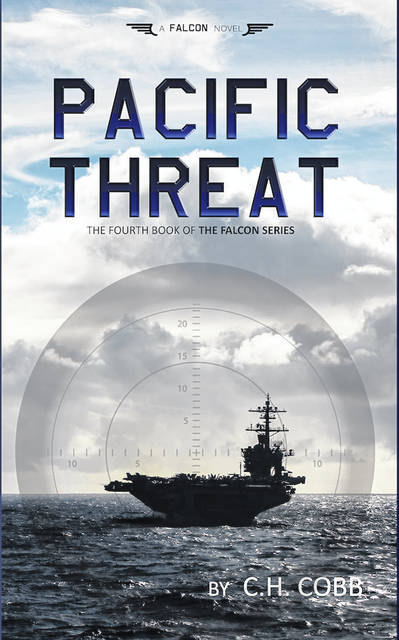

GREENVILLE — Local author and pastor Chris Cobb, also known by his pen name C.H. Cobb, recently released his new novel titled Pacific Threat (2020).
The book, a work of fiction grounded in historical events, is the fourth entry in Cobb’s Falcon Series, and chronicles events leading up to the 1991 Soviet coup attempt of Mikhail Gorbachev’s administration in hopes of preserving the last semblances of the U.S.S.R. The book can be purchased on Amazon, at the Bread of Life Bookstore in Greenville, and is available for borrowing at Greenville Public Library.
Cobb began taking his writing career seriously in 2002, and started by composing a 200,000 word sequel to a book written by famed American novelist and short story writer Louis L’Amour. Understandably, Cobb said, the L’Amour estate would not allow a sequel, but it was the beginning of his long-form, novel style writings. While deciding what to do with his manuscript, Cobb wrote Outlander Chronicles: Phoenix, which in 2011 became his first published novel. The sequel to Phoenix, Outlander Chronicles: Pegasus, was released in 2018.
Since then, Cobb has published eight novels and one non-fiction book titled A Prayer of Moses (2013) — a devotional commentary on Psalm 90. In 2020, Cobb also coauthored a children’s book with his granddaughter titled The Exciting Adventures of Inky the Cat (2020).
Cobb’s Falcon Series began in 2013 with the publishing of Falcon Down, which later led to the publishing of Falcon Rising (2013) and Falcon Strike (2014), thus birthing the series.
His new entry, Pacific Threat, aims to give readers a sense of the daunting complexities that naval officers face as they respond to threats while on the high seas. The book is positioned three years prior to the historic 1991 coup attempt.
Providing a brief overview of the history, Cobb stated that, around this time period, “…political fractures and factions were developing around negative responses to Gorbachev’s changing policies, typically referred to as glasnost and perestroika — or attempts by the Gorbachev administration to bring more transparency and openness to the institutions and government surrounding the Soviet Union. In the book, the coup plotters intend to take action in 1988, but realize the only way to ensure success is to unite the military behind them first. It is interesting to note that the actual coup in 1991 failed because the military was unwilling to shed Soviet blood. Knowing that armed forces unite during a hot conflict, the cabal plots to engage the U.S. Navy in a limited conflict. However, in order to provide necessary political cover on the international stage, it must appear that the U.S. is the aggressor.”
“This is the underlying theme that drives the story,” Cobb said, in reference to the historical events. “When the Deputy Director of Operations (CIA) is tipped off by a high-level Soviet official about the cabal’s dangerous plans, he must determine whether the warning is disinformation, or is a legitimate attempt to prevent war. In an effort to confirm the intelligence, the DDO decides to insert a spy into the Soviet Pacific Fleet headquarters.”
Cobb said that in a very real sense, he authored this book out of a desire to honor military men and women, and their families, who make countless sacrifices on behalf of all U.S. citizens. He said part of it comes from his desire to honor father’s service in the navy, who in World War II, flew Grumman F6F Hellcats off carriers in the Pacific Ocean.
To help write the book, Cobb interviewed Capt. James Fuqua, a retired Navy veteran who served for 24 years. Fuqua spent the last three years of his career as the commanding officer of the Lafayette Class ballistic missile submarine the U.S.S. Alexander Hamilton (SSBN 617). Cobb stated that Fuqua read his manuscript and helped him make the submarine scenes in the book more realistic and accurate to actual submarine warfare and life. He said his time spent with Capt. Fuqua is one of the things he treasures most about his time spent writing the book.
When asked what the biggest hurdles were when writing the book, Cobb confirmed that he struggled in some areas due to his own lack of military experience.
“While I’ve gotten marks for authenticity, it’s been at the cost of a great deal of research on military etiquette and training, ships, submarines, planes, and their sensors and weapon systems,” Cobb said. “I’ve read documents on Soviet naval doctrine and command structure, Soviet military training and political officers, as well as portions of books on submarine construction, and novels whose submarine scenes are counted by former submariners as very realistic. One of the challenges of this kind of research is making sure that it is all accurate to the time period of the story. I can’t very well put a radar system not deployed until the 90s on a ship in 1988.”
Beyond military matters, Cobb also spent a significant amount of time researching intelligence issues and cultural matters, even down to reading declassified CIA documents on the Soviet mail system to ensure that his scenes involving Soviet mail censors were accurate. Aside from that, he, like most novelists, struggled to come up with names for his characters due the differences in Slavic naming customs.
“Every single detail, ranging from the model of a vehicle, to a highway route designation in Vladivostok, to even the flora and fauna in a scene required research — and often extensive research.” Cobb concluded. “I won’t claim that every single detail is accurate — but the vast majority of them are.”
To conclude the interview, Cobb offered his thanks to everyone who helped him through the writing process.
“My wife is wonderfully and enthusiastically engaged in my writing. She is my preliminary editor. With her help I correct many problems before the piece goes out to my beta readers or my main editor. It’s fun to discuss the tale together — she invariably has great ideas about where to go next,” Cobb said. “I am blessed to have a family member, my sister Elizabeth, who is a professional quality editor. Added to her literary skills are the facts that she speaks Russian fluently and spent some of the Cold War years as a Foreign Service Officer in various countries of the U.S.S.R. She loves the Russian people, and has contributed greatly to the authenticity of the Russian scenes in all four books of the Falcon series.”
Chris Cobb lives with his wife Doris, and they will be celebrating their 43rd wedding anniversary later this year. The couple have three adult children and three grandchildren. Cobb came to Darke County in 2002 to work at the Bible Fellowship Church, where he has remained since, teaching small groups and doing biblical counseling.






